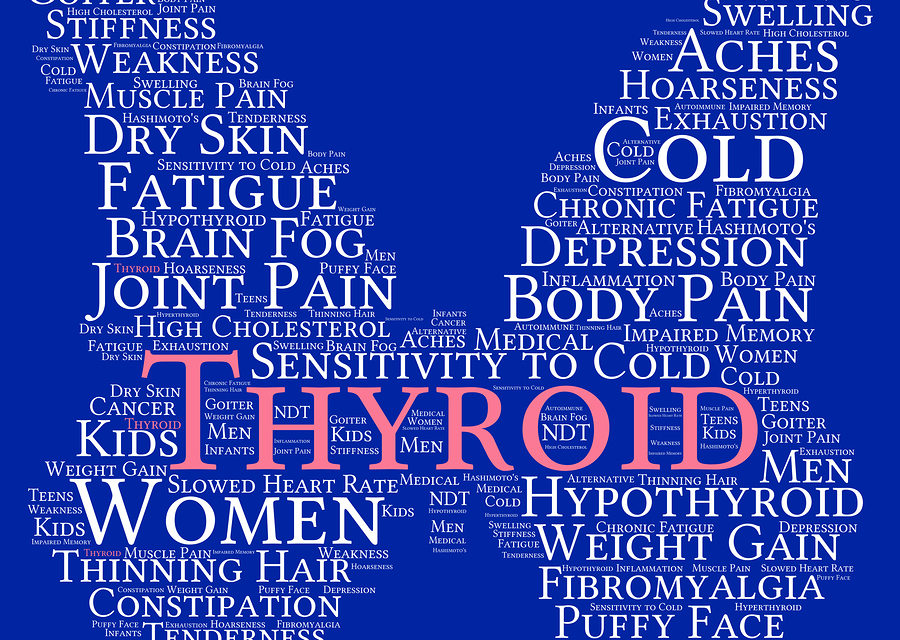Even if your thyroid has tested normal, you may still have a problem. There are many patients who are tired, depressed or cannot seem to lose weight. This trio of symptoms may be caused by hypothyroidism, a commonly missed medical condition. Think of the thyroid as the body’s thermostat. It regulates how fast we burn calories to produce energy. In hypothyroidism, metabolism slows down. It produces symptoms that include fatigue, depression, an inability to lose weight, constipation, and swelling of the ankles. Patients who have hypothyroidism tend to be cold and also tend to cry easily. Low thyroid function can even cause more serious symptoms like high cholesterol and delayed development in children. It is a problem that is commonly missed by doctors. According to research appearing in the Archives of Internal Medicine (2000;160:526-534.), 13 million Americans may have thyroid disease and not know it.
Thyroid testing totally inadequate, according to the British Medical Journal
The common test doctors use for thyroid problems is called TSH. TSH is a pituitary hormone that stimulates the thyroid gland—levels are used to screen for thyroid problems. The British Medical Journal [BMJ 2000;320:1332-1334 (13 May)] published research examining the flaws in diagnosing hypothyroidism. The authors concluded that there are indeed flaws with the way that we diagnose hypothyroidism. First of all, the research is lacking that shows us the relative importance of lab tests and symptomatology in diagnosing the thyroid. TSH production is affected by the level of thyroid hormone, but it is also affected by other things. We don’t fully understand how various illnesses affect TSH and the thyroid hormones. There is also a need to consider the possibilities of false positive and false negative results when looking at lab tests related to the thyroid. There is a distinct possibility that there are patients who have been told that their thyroids are “normal”, but in reality may be hypothyroid.
Hypothyroid diagnosis requires more than just lab tests
Many doctors using natural health care will rely on a basal body temperature test. Dr. Broda Barnes was critical of the lab work available to diagnose hypothyroidism. Dr. Barnes felt that the basal body temperature should be between 97.8 and 98.2 degrees. If a patient has a low basal body temperature and hypothyroid symptoms, that is justification to treat the thyroid. The problem is that many things can cause a low temperature. Using basal body temperature and symptoms to make this diagnosis is also unsatisfactory.
Fortunately, a number of doctors have been wrestling with this problem and there are now ways to combine lab information with symptoms and come up with a diagnosis—and a safe and reasonable treatment. When you treat with nutrition, you are using a therapy that has great potential to get good results without causing the same kind of risk to the patient that drug therapy poses. If you wish to learn more about the thyroid and about other issues in natural health care, contact our office.
Possible Signs and Symptoms:
Below are some of the symptoms of hypothyroidism. All of the symptoms need not be present for the patient to have hypothyroidism. Also, an underfunctioning thyroid can lead to high cholesterol, heart disease and immune system problems.
- Low body temperature. Patient feels cold even when others do not.
- Lack of motivation
- Poor memory
- Loss of interest in sex
- Dry, itchy or scaly skin
- High cholesterol
- Muscle cramps at rest
- Constipation
- Cysts and fibroids
- Sadness or crying for no reason (This can include women who have this symptom or experience mood swings at certain times during their menstrual cycle)
- Inability to lose weight
- Puffiness under the eyes
- Ankle swelling
- Depression
- Frequent colds
Barnes used the basal body temperature test to determine a possible problem with the thyroid. Patients takes their axillary temperature the very first thing in the morning before they get out of bed or even move around. They should even shake down the thermometer the night before (make sure that they use a mercury thermometer, not a digital one).
If the thyroid is functioning properly, the axillary temperature should be between 97.8°F and 98.2°F. Basal body temperature is a useful tool. Patients taking thyroid medication can be screened to see if their temperature is too high from taking too much hormone. You can have a woman take her basal body temperature throughout her cycle and get an idea of estrogen and progesterone levels. If she has excess estrogen, her temperature will be normal at mid-cycle, but begin to drop as she approaches her period and stays low until a few days after her period stops. If she has low progesterone, the temperature will be higher as she approaches her period and will decrease during her period, approaching normal as the period ends.
The problem with using body temperature as a diagnostic tool is the fact that other things besides the thyroid can be responsible for a low temperature. The good news is that nutrition is a low risk, high gain therapy. You have a very good chance of doing the patient some good—even if your diagnosis is not a slam dunk. When you improve someone’s thyroid function, you change their life. Even if you are wrong, it is unlikely that you will do any harm.
Using the patients’ symptoms, basal body temperature and looking at their blood tests with new eyes can enable you to effectively treat patients with hidden thyroid problems.
Hypothyroidism can cause a variety of health problems
Hypothyroidism can cause high cholesterol and heart disease. Now, research appearing in the Annals of Internal Medicine (2000; 132(4):270-8) shows that subclinical hypothyroidism and thyroid autoimmunity can also increase the risk of heart disease. Could it be that your patient who is on cholesterol lowering medication should actually be getting thyroid support? Hypothyroidism can be responsible for miscarriages. If an expectant mother has hypothyroidism and doesn’t miscarry, her baby will have a lower IQ than if her thyroid was normal [According to a study published in the New England Journal of Medicine (1999;341:549-555, 601-602),]. Problems losing weight, dry skin and immune system problems may have the thyroid at their root.
An article in Environmental Health Perspective (June 2000;108(Suppl 3):433-438) reviewed the importance of the thyroid for brain function and the effect environmental chemicals have on both the thyroid and the nervous system. Proper thyroid function is especially important for brain development in the fetus and during the first two months after birth. Animal studies have shown that exposure to PCBs and dioxins create abnormal neurologic function and impaired thyroid function. Chemical exposure can enlarge the thyroid, and decrease T4 levels. Many environmental toxins mimic thyroid hormones and bind to proteins used to transport thyroid hormone, competing with thyroid hormone and altering function.
As many as 13 million Americans may have an undiagnosed thyroid problem, according to a study known as the Colorado Thyroid Disease Prevalence Study. The study was performed by Knoll Parmaceutical (makers of Synthroid). Over 25,000 participants were studied in 1995. The researchers found that nearly 9% of the participants who were not on thyroid medication were hypothyroid and a little over 1% were hyperthyroid. If this number were extrapolated to the entire US population, the number of patients with an undiagnosed thyroid problem would number 13 million. The study also found that even “subclinical” hypothyroidism, may raise cholesterol levels.
Research appearing in the American Journal of Psychiatry (March 1993;150:3:508-510) suggests that the thyroid may be involved with some cases of depression. It was a small study that looked at 16 patients with subclinical hypothyroidism and 15 with normal thyroid function. The frequency of depression over the course of a lifetime was higher in the group with subclinical hypothyroidism.
Expectant mothers should have their thyroids checked
According to a study published in the New England Journal of Medicine (1999;341:549-555, 601-602), if a woman is pregnant and has hypothyroidism, the IQ of the child may be adversely affected. Women with untreated thyroid deficiency during pregnancy are 4 times more likely to have children with lower IQ scores. 19% of the children whose mothers had undiagnosed hypothyroidism during pregnancy averaged 85 or less on their IQ tests. Children who have an IQ less than 85 are more likely to have difficulties in school. Children between the ages of seven and nine, with mothers who had untreated hypothyroidism, scored an average of seven points lower on IQ tests than children with mothers that had normal thyroid function. The article goes on to say that during the first 12 weeks of pregnancy the fetus relies entirely on the mother for thyroid hormone. They thyroid may play a role in brain development.
One interesting side note is for patients who have been on Synthroid and are still having symptoms; they are usually having trouble converting T4 to T3. The doctor monitoring the levels will usually say that everything is fine. If you give this patient Meda-Stim, they will feel infinitely better because Meda-Stim (another Biotics product) helps with the conversion from T4 to T3 (the more active form of the hormone).
Research appearing in the Journal of Pediatrics (epublished ahead of print April 12, 2011) looked at the relationship between maternal thyroid function, iodine levels and child development. The level of free thyroxine in the mothers of the children in the study was measured during the first trimester of pregnancy. The 86 children involved in the study were evaluated using the Bayley Scale of Infant Development at 12, 18 and 24 months of age.
Researchers found that there was a relationship between the mothers’ free thyroxine levels and the children’s psychomotor development at ages 18 months and 24 months. The children of mothers in the bottom 25th percentile of free thyroxine levels tended to be more developmentally delayed than the children of mothers with higher thyroxine levels. The authors of the study saw these findings as showing a need for iodine supplementation before conception and during pregnancy and lactation.
Of course there is much more to treating thyroid than what is here. There are autoimmune problems and hyperthyroidism. Hypothyroidism is much more common and you can get great results with a number of complaints including:
- Obesity and trouble losing weight
- Fatigue
- Depression
- High Cholesterol
- PMS
- Ovarian cysts
- Uterine fibroids
- Dry skin
- Some headaches (usually one that starts in the morning and fades as the day goes on)
Paying attention to thyroid function can prevent heart disease, miscarriages and improve the IQ of the newborn.






